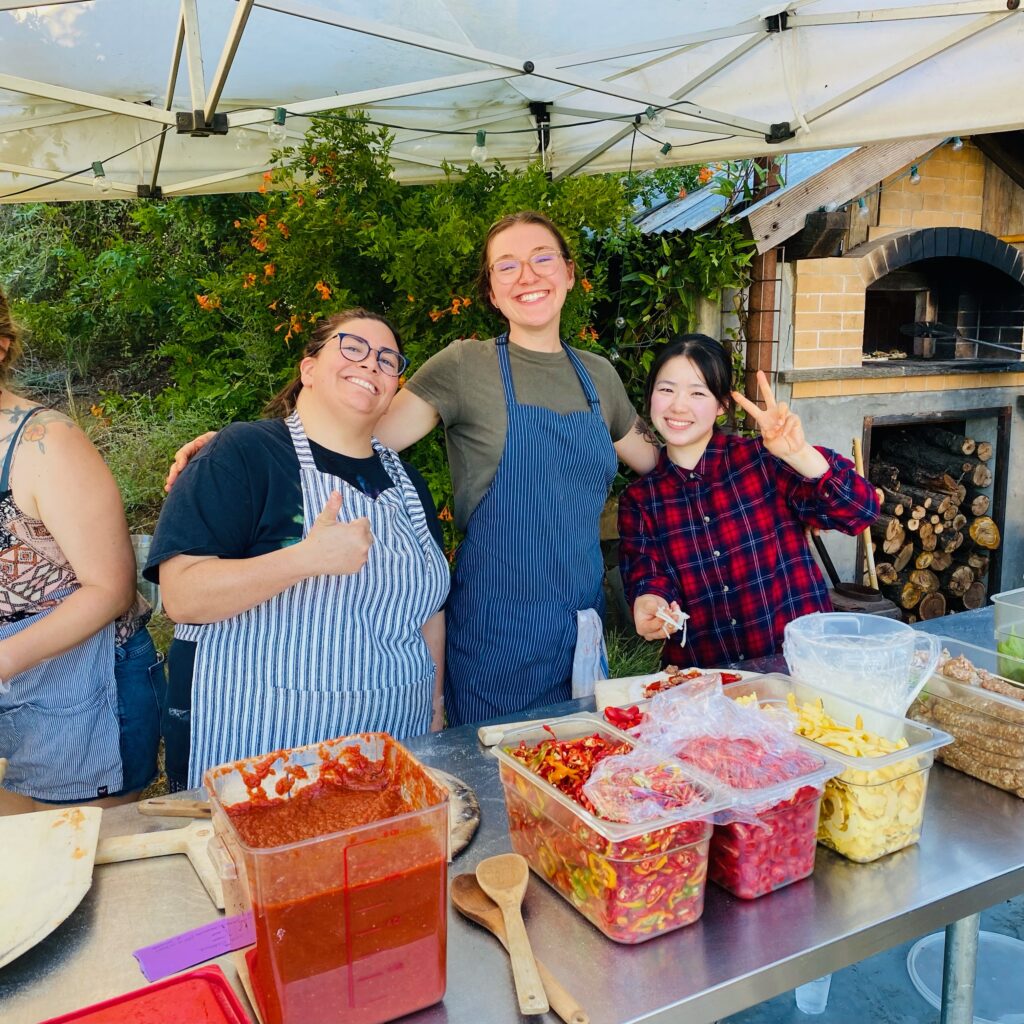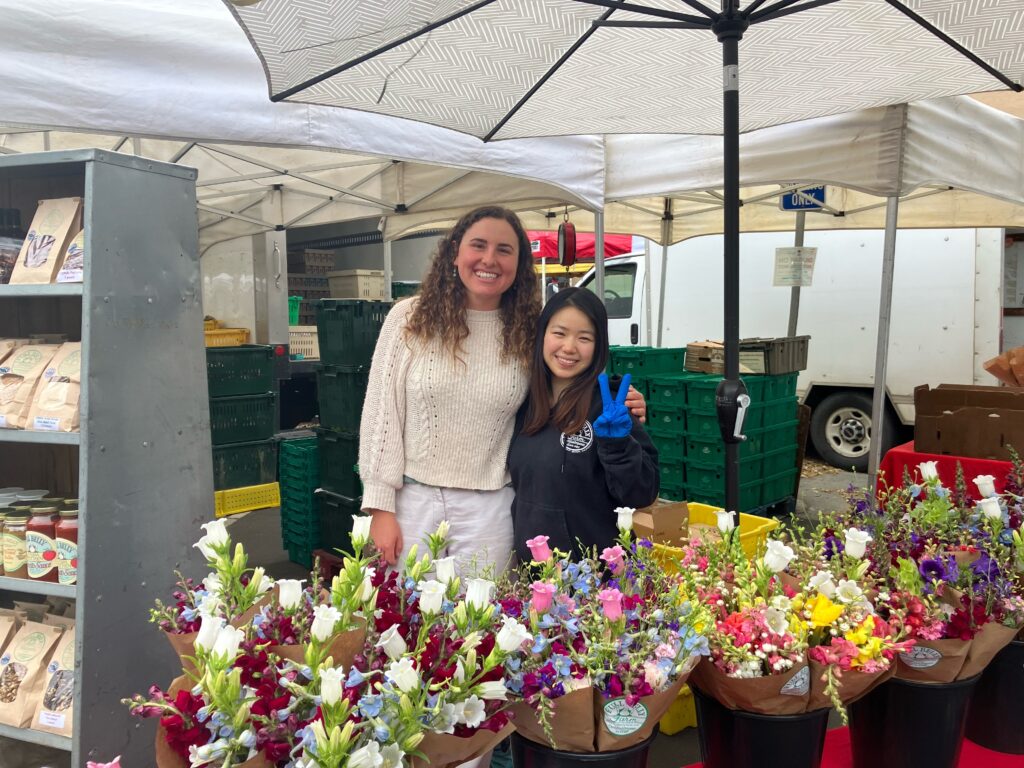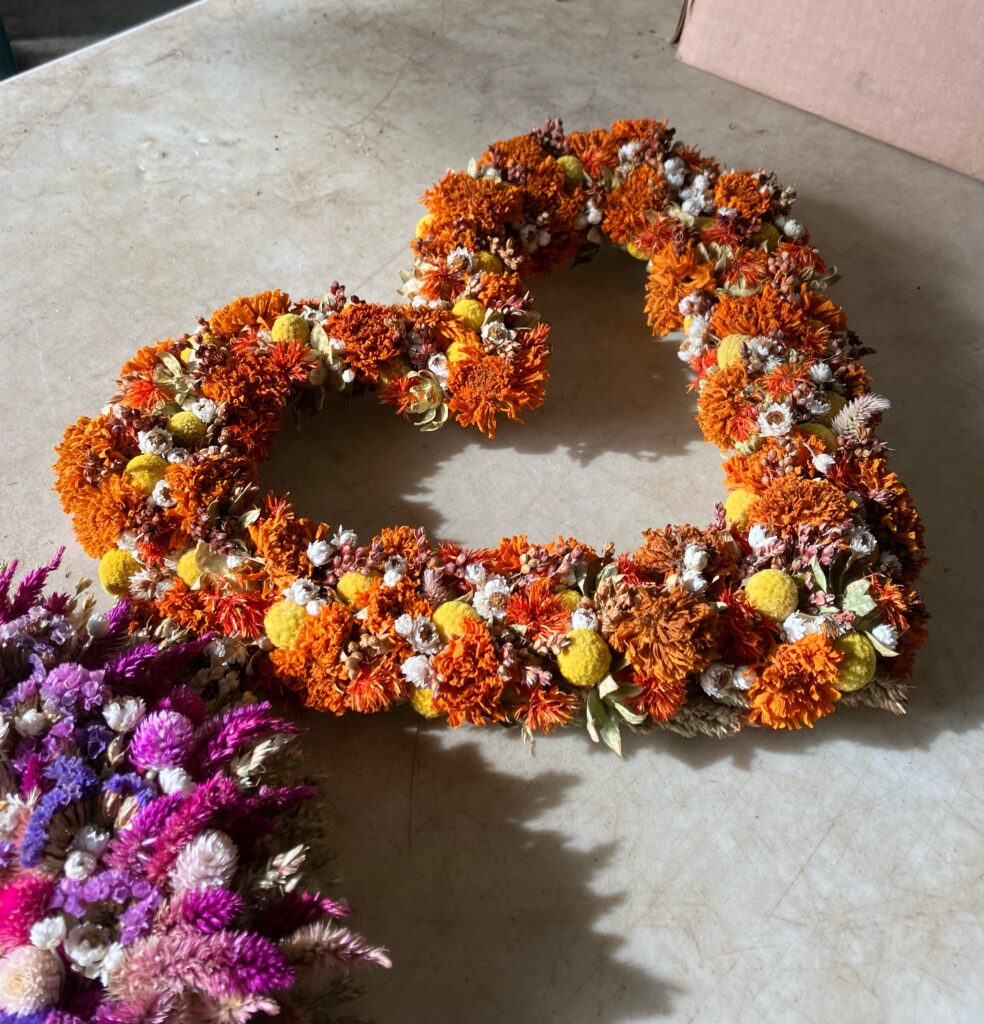
A few weeks ago, we shared an interview with Isshin, one of our interns. Today I’d like to share an interview with Mai Inoue, another Full Belly Farm intern, and also a member of the 2022-2023 Japanese Agricultural Training Program cohort. You may have met her at a Saturday Palo Alto farmers market or Pizza Night over the past year, plus she pops up at the occasional Thursday Marin farmers market. And if you’ve gotten a bouquet of flowers this season, you’ve definitely been a recipient of her handiwork. She’s a great cook and baker (and often can be found making cookies with Oakley and Waylon), she takes sun protection seriously (she can always be seen with her super wide-brimmed hat), and is incredibly nice. And a fun fact about her is that she worked at the 2021 Tokyo Olympics and Paralympics in the dining hall, both cooking and talking with the athletes and coaches!
I interviewed Mai after work last week and have a slightly edited version of our conversation below.
– Elaine Swiedler, CSA Manager

Where did you grow up?
I was born in Kagoshima prefecture and grew up in Kanagawa prefecture. In the city, not on a farm.
Were you exposed to farming as a kid?
My grandparents, my mom’s parents, used to grow fruits and vegetables and flowers in their garden. Every time I went to visit, I enjoyed harvesting what they grew. I remember harvesting tomatoes, okra, eggplant, carrots, blueberries, and a lot more. They also grew shiitake mushrooms! I also remember cooking with them. And we would cut bamboo to make chopsticks and nagashi somen.
My parents liked nature and had a garden too. They taught me about farming and cooking.
So how did you get into agriculture? And what made you want to come to the US?
I went to college to study nutrition. I choose nutrition because food is so essential and important; we need to know how to eat. We can learn about food but it’s harder to learn about who is growing it and how. I wanted to learn more so I joined an agricultural club. We would visit different farms and work there for a day, or a few days. We also had a very small farmers market where we sold a few things, especially onions. [Note: you can check out the club website here, though most folks will need the help of a translator computer program].
I like talking with foreigners so I helped at a summer english exchange camp. I wanted to study abroad so I looked around on the internet and found this program. I had wanted to learn more about production, so it seemed perfect. After I found out I was accepted into the Japanese Agricultural Training Program, I worked at an organic farm in Chiba prefecture for two months.
I happened to watch a former Japanese intern explaining about Full Belly Farm on YouTube and became very interested in it. So, I asked my coordinator if I could be assigned to this farm.
What do you like doing at the farm?
I do like doing the normal farming jobs (seeding, planting, harvesting, weeding) and working with the flowers, like making bouquets and wreaths, but I especially like working at the farm events and at the farmers markets.
Why?
I like to talk with customers and vendors. We get to tell about our products and I get to learn how the customers like to cook. I have a lot of cooking experience but there are things I’ve never had before and sometimes they teach me!
What’s something new that you tried here?
I had never had rutabaga before! I like to roast it, or putting it in Japanese curry.
What’re your current favorite things we’re harvesting?
That is a hard question to answer. But I really love the cherry tomatoes, peaches, figs, and Jimmy Nardello peppers.
What’s something that surprised you in your time here?
In Japan I sometimes worked at the market or at festivals. Customers there are excited to pick out their produce, to try new things, and ask questions and find new crops. In the US, the customers are excited too. It feels very similar in both places and I didn’t expect that.
But there are some things that are different about the farmers markets and produce. Like peaches and parsley. In Japan, curled parsley is more common than Italian parsley, while flat parsley is more common at American farmers’ markets. When it comes to peaches, white peaches are more popular in Japan while yellow peaches are more often seen in canned form. I was surprised to see that yellow peaches are much more popular in the U.S. than white. I love both!
What’s something you still want to do at the farm?
I would like to like to try animal jobs, like milking a cow. I would also like to help cook at the kitchen, not just for events, but when they make the products like tomato sauce and jam.
After you leave the farm, what’s next?
First, I will go with the rest of the program to UC Davis for two months. After I finish the program, I am going on a trip to Spain with my sister. Then I have two more years of college to finish my nutrition degree. Before I graduate I would like to take more classes that talk about cooking and farming.
Before I graduate, and after too, I would like to conduct activities to connect production and consumption, such as holding farmers’ markets, agricultural experience events, dietary education and cooking classes, especially for children, and collaborating with farmers and chefs. I think I will probably work for a food company for my main job, but would also like to do those things.
That sounds great! As you go forward, what do you think are the most valuable experiences and skills you will take from your time here?
So many things. How to set up a farmers market display, how to cook lots of vegetables, and how to talk about many common American fruits and vegetables.

